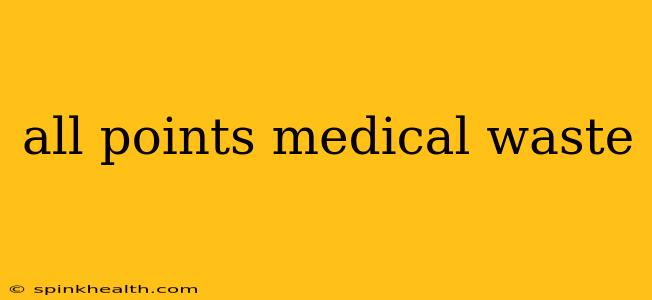Medical waste. The term itself conjures images of biohazard symbols and stringent disposal procedures. But understanding medical waste goes far beyond just knowing it's dangerous; it's about grasping the complexities of its generation, the risks it poses, and the crucial role proper management plays in protecting public health and the environment. Let's delve into all the crucial points surrounding this critical topic.
What is Considered Medical Waste?
This isn't a simple question, as the definition of medical waste can vary slightly depending on location and specific regulations. However, generally, medical waste encompasses any material generated during the diagnosis, treatment, or immunization of humans or animals. Imagine a busy hospital—everything from used needles and syringes to blood-soaked bandages, contaminated lab specimens, and even discarded pharmaceuticals falls under this umbrella. Even seemingly innocuous items like gloves and gowns can be considered medical waste if they've come into contact with infectious materials. The common thread? The potential for the waste to transmit infectious diseases or pose a hazard to human health and the environment.
What are the Different Types of Medical Waste?
Medical waste isn't a homogenous blob; it's categorized into several types, each demanding specific handling procedures. These categories often include:
- Infectious waste: This category holds the most significant risk, including items contaminated with blood, body fluids, or pathogens that can cause disease. Think used needles, blood bags, and surgical dressings.
- Sharps waste: This is the most hazardous type, encompassing needles, scalpels, and other sharp instruments that can cause injury during handling and disposal.
- Pathological waste: This includes human tissues, organs, and body parts removed during surgery or autopsy.
- Pharmaceutical waste: This refers to expired or unused medications, including both liquid and solid forms. Improper disposal can lead to environmental contamination and potential misuse.
- Chemical waste: This can range from disinfectants and cleaning agents to laboratory chemicals, all potentially harmful if not handled correctly.
- Radioactive waste: This is generated by medical imaging procedures and requires special handling due to its radioactive properties.
- General waste: This includes non-hazardous items like paper, plastic, and food waste that aren't contaminated with infectious materials.
How is Medical Waste Managed and Disposed Of?
Effective medical waste management is paramount. It's a multi-step process starting at the point of generation. Hospitals and healthcare facilities employ color-coded bins and containers to segregate different types of waste. This ensures that infectious materials are handled separately from other less hazardous items. Once segregated, the waste undergoes several processes depending on its type:
- Incineration: This high-temperature process effectively destroys infectious agents and reduces the volume of waste.
- Autoclaving: This uses steam sterilization to kill microorganisms before disposal.
- Chemical disinfection: This method uses chemicals to decontaminate waste before further processing.
- Landfilling: While often the final destination for non-hazardous waste, careful procedures must be followed to prevent environmental contamination.
What are the Risks of Improper Medical Waste Disposal?
The consequences of improper medical waste disposal are far-reaching and severe. Accidental needlestick injuries can lead to infections like HIV or Hepatitis B. Improperly disposed infectious materials can contaminate water sources, posing risks to the environment and human health. Furthermore, pharmaceutical waste can leach into the soil and water, affecting aquatic life and potentially entering the food chain. The environmental impact extends to air pollution from incineration if not managed correctly. Proper management is essential to mitigating these risks.
What Regulations Govern Medical Waste Management?
Medical waste management is heavily regulated at both national and international levels. Specific regulations vary by country and region, but generally aim to establish standards for handling, storage, transportation, and disposal to ensure public health and environmental protection. These regulations frequently specify requirements for containers, labeling, and treatment methods, as well as penalties for non-compliance.
How Can I Contribute to Safe Medical Waste Management?
Even outside of a healthcare setting, individuals play a role in responsible waste management. Proper disposal of household medications, such as returning them to a pharmacy for safe disposal, prevents them from entering the general waste stream. Staying informed about local regulations and guidelines is crucial.
Medical waste management isn't just about regulations; it's about safeguarding public health and environmental sustainability. Understanding the various types of medical waste, the risks involved, and the management practices employed is critical for ensuring a safer and healthier world.

